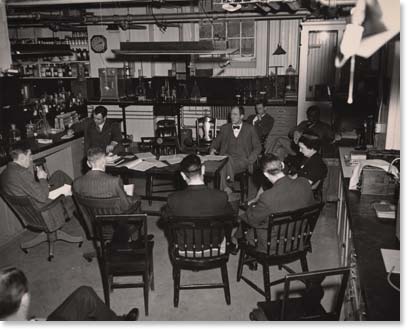
Human Relations and Harvard Business School
The subject of human relations in industry is one of the most important things in the whole field of business and one which we must investigate and teach.Wallace B. Donham, Dean of Harvard Business School to Harvard President A. Lawrence Lowell, 1925
 Harvard Fatigue Laboratory, 1946
Harvard Fatigue Laboratory, 1946HBS Archives Photograph Collection
At Harvard Business School, Dean Donham began to shift the focus from scientific management and applied economics to human relations, a growing course of study. Mayo’s 1935 research course “Human Problems of Administration” included readings and discussions on recent developments in physiological and psychopathological studies, the French Sociological School, anthropological studies, and the theories of Italian economist Vilfredo Pareto. Mayo also formed a close partnership and friendship with L. J. Henderson, physiologist and biochemist. Henderson ran the Harvard Fatigue Laboratory, located in the basement of the Business School’s Morgan Hall, where researchers studied human reactions to environment, including the effects of fatigue on productivity.
Together, Donham, Mayo, and Henderson had a lasting influence on the direction of Harvard Business School’s curriculum and research, which embraced applied, empirical-based studies and a multi-disciplinary approach incorporating biology, physics, biochemistry, psychology, sociology, and anthropology. “In Mayo’s time . . . the idea of considering human relations in factories and offices was astonishing,” Abraham Zaleznik, Professor of Leadership, Emeritus, at Harvard Business School, notes.2 In a letter to Donham in 1939, Mayo expressed his gratitude for Donham’s “steady support through difficult years and the part it played in the development of this work.”3 Human relations was later integrated into other programs at Harvard and further developed by Business School professors such as George Lombard, a leader in the field of organizational behavior.
- Baker Library | Historical Collections | Site Credits | Digital Accessibility
- Contact Email: histcollref@hbs.edu